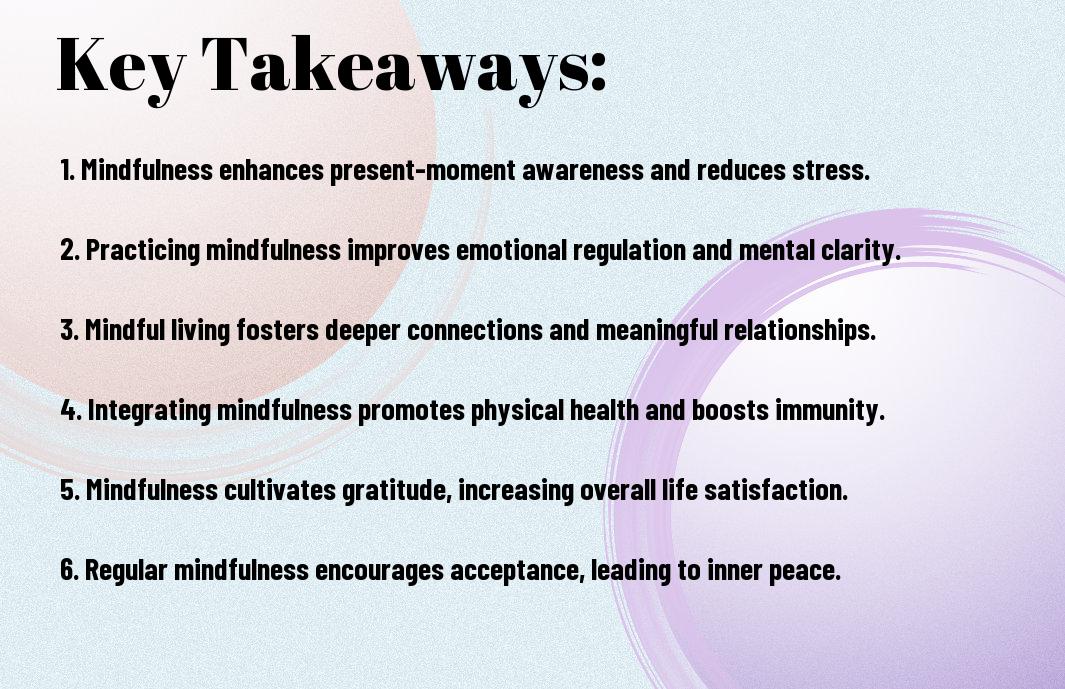Mindfulness offers you a powerful way to connect with your inner self and enhance your overall well-being. By consciously focusing on the present moment, you can reduce stress, improve mental clarity, and foster a deeper sense of happiness. This practice not only supports your emotional balance but also positively influences your physical health, creating a harmonious state where new meaning in life emerges naturally. Exploring how mindfulness intertwines with health empowers you to cultivate lasting fulfillment and resilience in your everyday experiences.
Key Takeaways:
- Mindfulness practice enhances overall well-being by fostering presence and reducing stress, leading to improved mental and physical health.
- Engaging in mindful activities cultivates a deeper sense of purpose and happiness, helping individuals find new meaning in their daily lives.
- Integrating mindfulness into health routines encourages self-awareness, which supports healthier lifestyle choices and emotional balance.

Understanding Mindfulness
A deep understanding of mindfulness allows you to fully embrace its benefits in your daily life. By becoming aware of the present moment without judgment, you learn to cultivate a calm and focused mind. This practice enhances your emotional intelligence and overall well-being, offering a pathway to new meaning and happiness.
Definition and Origin
One way to grasp mindfulness is by exploring its definition and historical roots. Mindfulness involves paying purposeful attention to your present experiences with openness. Originating from ancient Buddhist traditions, it has been adapted into modern psychology, helping you manage stress and improve mental clarity in today’s fast-paced world.
Principles of Mindfulness
Behind mindfulness are core principles that guide your practice: intentional awareness, non-judgment, patience, and acceptance. These principles empower you to observe your thoughts and emotions without getting overwhelmed, fostering a balanced and compassionate mindset that enhances your health and happiness.
The Principles of Mindfulness emphasize that you should maintain an open and curious attitude toward your experience. Rather than reacting or avoiding discomfort, you gently acknowledge sensations, thoughts, and feelings as they are. This approach builds resilience and helps you respond thoughtfully to challenges, transforming your relationship with yourself and others.
The Connection Between Mindfulness and Health
Clearly, mindfulness plays a pivotal role in enhancing your overall health by fostering a deeper awareness of your body and mind. Through its practice, you nurture a balanced state that supports both physical and mental well-being, helping you to manage stress and improve your lifestyle choices consciously.
Physical Health Benefits
Before engaging in regular mindfulness practices, you might not realize how significantly your body can benefit from them. Mindfulness has been shown to lower blood pressure, reduce chronic pain, and boost your immune system, enabling you to experience greater vitality and resilience against illness.
Mental Health Benefits
Benefits of mindfulness for your mental health include reducing anxiety, alleviating symptoms of depression, and enhancing emotional regulation. When you practice mindfulness, you become better equipped to handle negative thoughts and improve your mood, leading to a more peaceful and positive mindset.
A deeper understanding of mental health benefits reveals that mindfulness promotes neuroplasticity, helping your brain adapt and function more effectively. This adaptability supports improved focus, memory, and emotional stability, allowing you to cultivate a more mindful response to life’s challenges and boost your overall happiness.
Practicing Mindfulness in Daily Life
Unlike fleeting moments of distraction, practicing mindfulness means intentionally focusing your awareness on the present experience with openness and curiosity. When you engage in mindful living, you develop a deeper connection to your thoughts, emotions, and surroundings, enhancing both mental clarity and emotional well-being. By regularly integrating mindfulness into your day, you can find new meaning and happiness that positively impacts your health and overall quality of life.
Techniques and Exercises
For a practical start, you can try simple mindfulness techniques such as mindful breathing, body scans, or paying close attention to your senses during everyday activities. These exercises help you anchor your mind firmly in the moment, reducing stress and fostering calm. By dedicating just a few minutes daily to these practices, you cultivate awareness that allows you to approach challenges with greater balance and resilience.
Incorporating Mindfulness into Routine
One effective way to benefit from mindfulness is by weaving it seamlessly into your existing routines. Whether during morning coffee, commute, or mealtime, you can use these moments as opportunities to practice presence and nonjudgmental awareness. This consistent integration helps transform mindfulness from a practice into a natural part of your life, promoting sustained improvements in mental and physical health.
Exercises that embed mindfulness into your daily habits might include pausing to feel your breath before starting work, fully focusing on the taste and texture of your food, or engaging in mindful walking. By turning routine actions into mindful rituals, you enable your mind to rest in the present, which enriches your daily experience and nurtures a lasting sense of happiness.
Mindfulness and Emotional Well-being
Many people find that practicing mindfulness enhances their emotional well-being by helping them stay present and fully engaged with their feelings. When you develop a mindful awareness of your emotional states, you gain greater clarity and control, which fosters resilience and emotional balance. This practice encourages a non-judgmental acceptance of your emotions, allowing you to respond thoughtfully rather than react impulsively. By cultivating mindfulness, your overall sense of happiness and inner peace can significantly improve.
Enhancing Emotional Intelligence
With mindfulness, you become more attuned to your own emotions and those of others, boosting your emotional intelligence. This heightened awareness enables you to recognize subtle emotional cues, manage your reactions effectively, and communicate with empathy. As you strengthen your emotional intelligence, you improve your relationships and increase your capacity for compassion, which contributes to a more fulfilling and meaningful life.
Reducing Stress and Anxiety
Before stress and anxiety overwhelm you, mindfulness offers tools to ground your attention in the present moment. By focusing on your breath or bodily sensations, you can interrupt negative thought cycles and create a calm mental space. These practices help you detach from worries about the past or future, reducing the intensity of anxious feelings and promoting a sense of serenity.
Consequently, regular mindfulness practice can rewire your brain to respond more calmly to stressors. You learn to observe your thoughts without judgment, diminishing the power of stress-inducing patterns. Over time, this shifts your baseline emotional state towards greater stability, enabling you to navigate life’s challenges with increased ease and confidence.

Mindfulness in Relationships
Noticing the present moment without judgment can transform how you engage with others. When you practice mindfulness in relationships, you become more aware of your own feelings and reactions, which allows you to respond rather than react. This presence fosters deeper connections and a greater sense of trust and understanding, enriching your interactions and ultimately bringing more meaning and happiness to your life.
Improving Communication
Mindfulness sharpens your ability to listen actively and communicate thoughtfully. By being fully present during conversations, you can better understand the perspectives and emotions behind words. This heightened awareness reduces misunderstandings and encourages open, honest dialogue, helping you build stronger, more authentic relationships.
Cultivating Empathy and Compassion
Compassion grows naturally when you are mindful of your own emotions and those of others. By tuning into feelings without judgment, you create space for empathy, allowing you to connect deeply with others’ experiences. This practice nurtures kindness and warmth, enhancing your relationships and contributing to your overall well-being.
Further, cultivating empathy and compassion through mindfulness means embracing vulnerability and showing genuine care in your interactions. You become more patient and tolerant of differences, which paves the way for healing and mutual support. As you develop this skill, your relationships become a source of emotional resilience and joy, helping you lead a more fulfilling life.
Challenges in Practicing Mindfulness
Despite the benefits mindfulness offers for your mental and physical health, engaging consistently in the practice can be difficult. Various internal and external factors might interfere with your ability to maintain focus and presence. Understanding these challenges is imperative to developing a sustainable mindfulness routine that truly enhances your well-being.
Common Obstacles
One primary obstacle you may face is a restless mind that resists stillness, making it hard to anchor your attention. Additionally, busy schedules and distractions pull you away from dedicated practice, while skepticism about mindfulness’s effectiveness can diminish your motivation to continue.
Strategies to Overcome Challenges
Common ways to overcome these barriers involve setting realistic goals and creating a quiet, distraction-free space to practice. Incorporating short, frequent mindfulness sessions into your daily routine can help build consistency. Seeking guidance through apps or experienced practitioners can also support your journey.
Due to the varying nature of obstacles you encounter, adopting a flexible and patient approach is beneficial. Tailoring mindfulness exercises to suit your lifestyle and preferences increases the likelihood of persistence. By gradually expanding your practice and acknowledging small progress, you reinforce positive habits that deepen your mindfulness experience over time.
To wrap up
From above, exploring the art of mindfulness and health reveals how you can infuse new meaning and happiness into your daily life. By cultivating awareness and embracing present moments, you enhance your well-being while creating a deeper connection to yourself and others. Incorporating mindfulness practices into your routine empowers you to manage stress effectively and promotes a balanced, fulfilling lifestyle. As you continue this journey, you unlock a richer experience of life’s joys and challenges, fostering resilience and a profound sense of peace that supports your overall health and happiness.
FAQ
Q: How does practicing mindfulness contribute to overall health and happiness?
A: Practicing mindfulness enhances both mental and physical health by encouraging present-moment awareness and reducing stress. This focused attention helps individuals manage anxiety and depression more effectively, leading to improved emotional regulation. Additionally, mindfulness supports healthier lifestyle choices and can lower blood pressure, contributing to better overall well-being and a deeper sense of happiness.
Q: What are some practical ways to integrate mindfulness into daily life?
A: Mindfulness can be integrated through simple activities such as mindful breathing, paying close attention to the sensations while eating, or engaging fully in routine tasks like walking or washing dishes. Setting aside a few minutes daily for guided meditation or body scan exercises can also cultivate mindfulness. The key is consistency and approaching these moments with openness and without judgment.
Q: In what ways can mindfulness provide new meaning in life?
A: Mindfulness encourages individuals to connect more deeply with their experiences, fostering greater self-awareness and appreciation for the present. This heightened awareness can reveal values and passions that may have been overlooked, guiding people toward more meaningful goals and relationships. By shifting focus from past regrets or future worries to current realities, mindfulness can transform one’s experience of life, enriching it with purpose and contentment.





